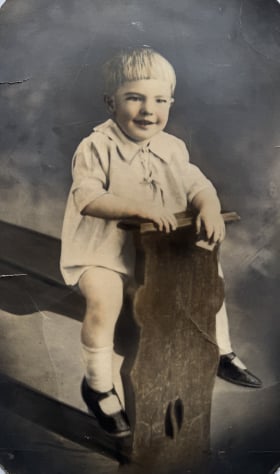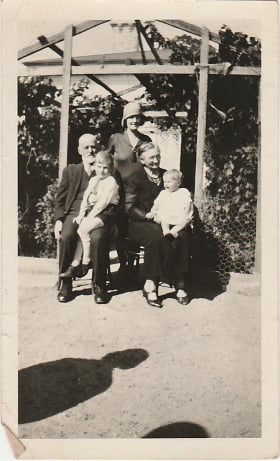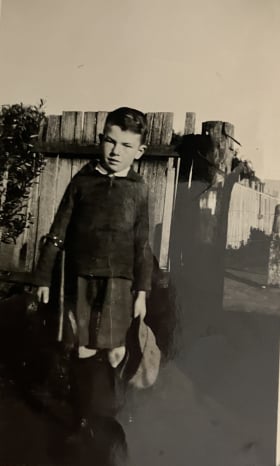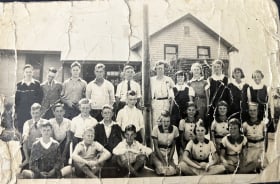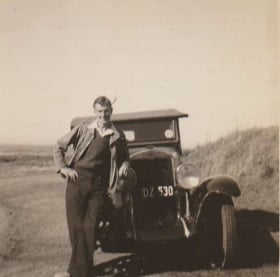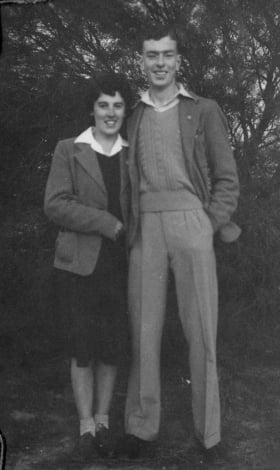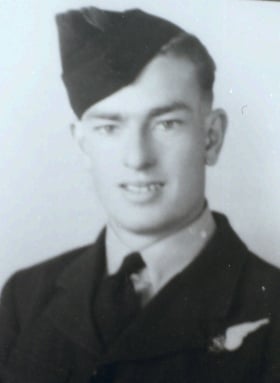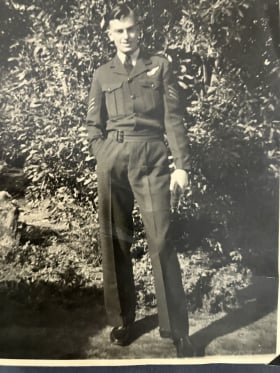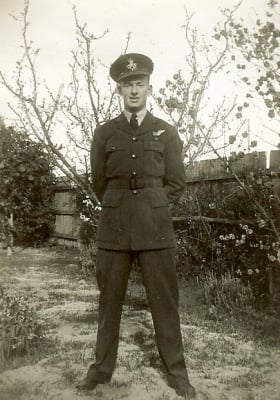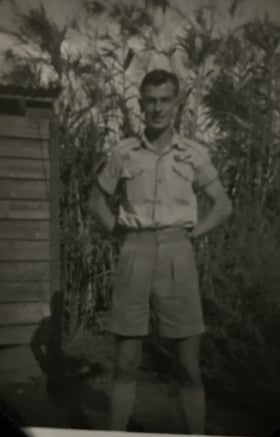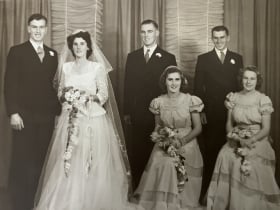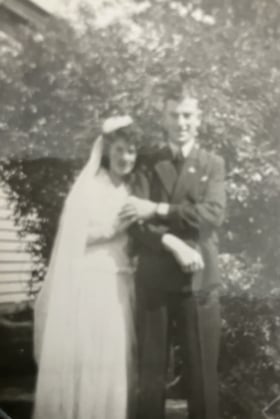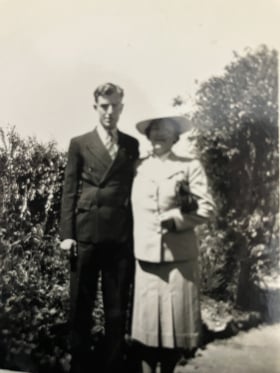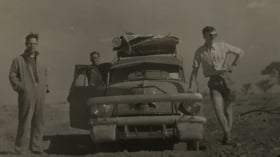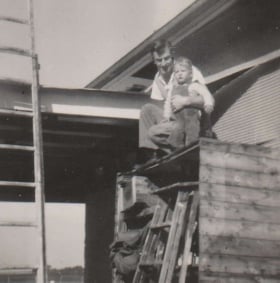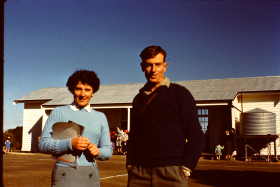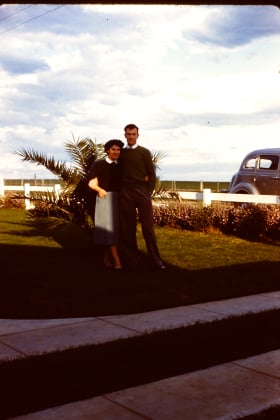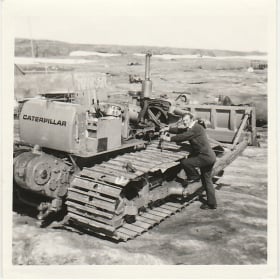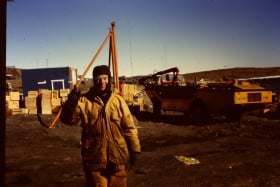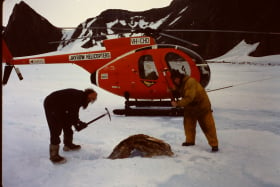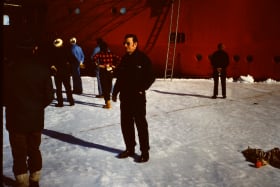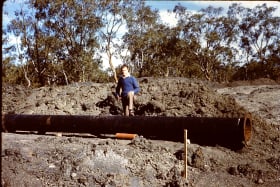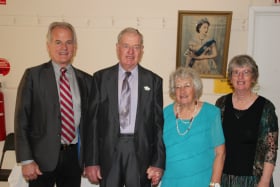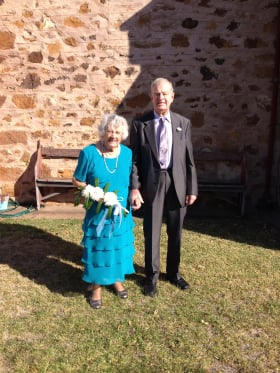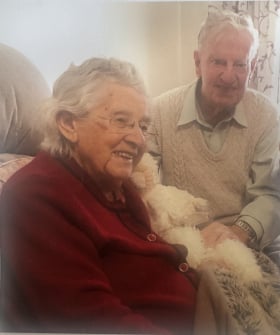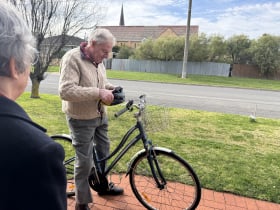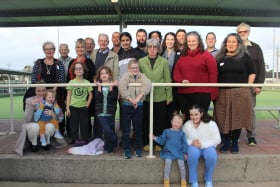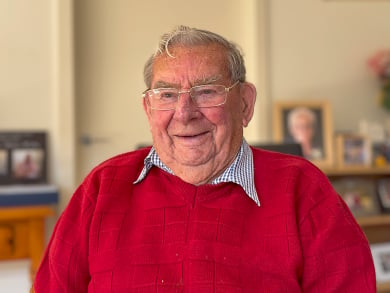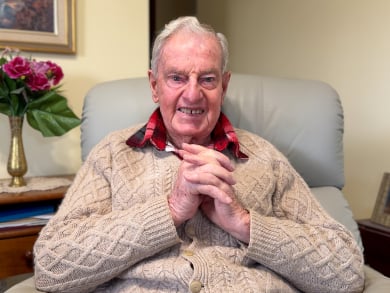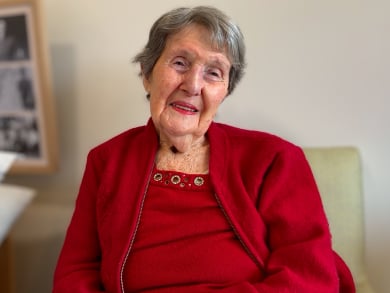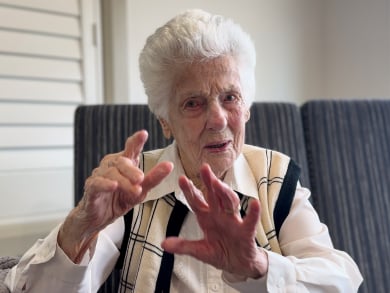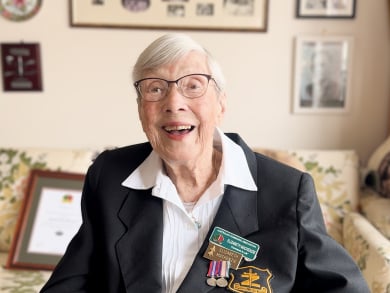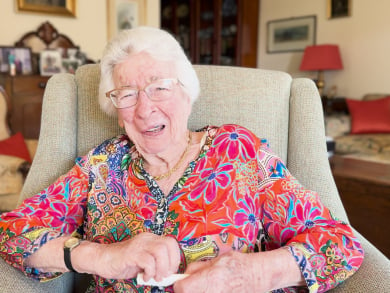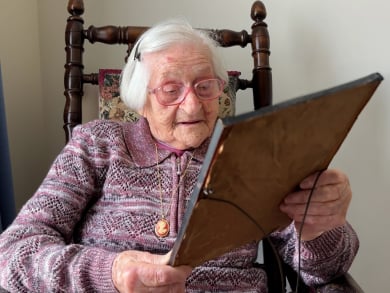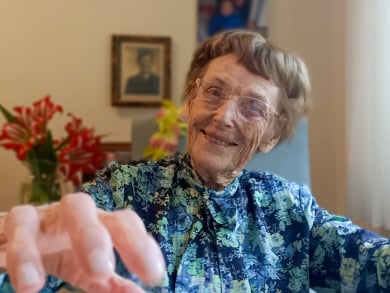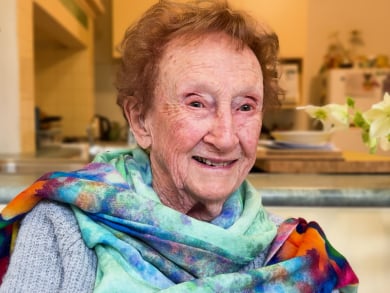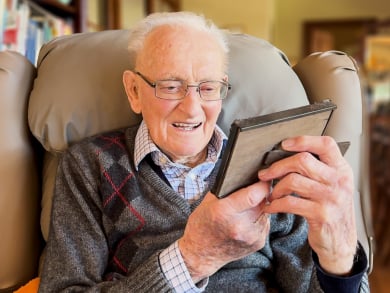Closed captioned icon
View audio transcription
"What's your favourite car
that you owned?"
Oh... yeah.
60 model Chev.
It was big, it was powerful and fast.
Merv Schneider.
And I was born in Woomelang
up in the Mallee.
16th of July, 1925.
We were only a small family.
Mum, Dad and my sister, Una, and myself.
My father got a garage up in Woomelang.
Very small, not that impressive, but
they didn't have, hoists or lifts
in those days.
They had a pit to put the cars over and
earthen floors.
Big challenge, of course, was
maintenance on the cars because the roads...
Well, they just weren't made...
so...
My mother was English so
I was baptized Church of England
and I went to the Church of England.
The ladies in those days,
the wives, they were very tolerant.
There were no washing machines.
[They] washed by hand or boiled in the copper.
"Yes, a pretty laborious job,
but they seem to all accept it."
What's your earliest memory?
Oh, going to films.
Silent films.
There were no talkies in my day.
Yeah.
Charlie Chaplin.
It was a travelling, travelling show
it used to be in the back of a van.
Ouyen and Birchip ways.
He would go to the local hall.
Had a power plant in his van
because there's no electricity.
"Lady on the stage
would play background music."
"It was quite
an outing to go to the picture shows."
Yeah.
And then later on we went to Hopetoun
"to see the first actual ‘talkie’
they were called."
And how often did you go to see films?
Once every two months probably.
Not very often.
Yeah.
"Well, that was the Depression years,
and that was a disaster."
"I was only five
but the impact was almost instant,"
you know, people went from being
fairly well off to
not having any finances.
Unemployment was high.
They called it ‘sustenance’,
People out of work
and they got two pound a week.
And we were on the main line to Mildura
and the railway line, they called it
‘jumping the rattler’ to get to Mildura
to try to pick fruit to earn some money.
"They would stop,
clear the train at Woomelang."
They were starving.
"They'd come around,
they’d cut the wood for "
“for a sandwich and a cup of tea, Mrs.”
"I was a bit lucky in the fact
that my father still had a business."
my mother was a wonderful cook.
"She'd been in a boarding house
when she was young"
and kids, starving,
they’d came home from school to
the Schneider’s place
to get a sandwich or something to eat.
They did help each other.
Other families. They did.
I grew up always
" recognizing that other people
were worse off than I was "
and to support them so
"yeah, it stayed with me
all my life, I’d have to say."
That would never go away because it was,
even though I was only young,
"right up to when I came here
to Nhill to high school,"
it was tough.
Tough, tough.
it showed up in the schools.
"Kids were coming to school [with]
no shoes or socks."
Well, I started school at four and a half.
I can remember the day very well.
I was left handed.
That was a day of awakening for me
"because we weren't
allowed to write left handed."
So it was
called ‘corporal punishment’.
"It was a piece of dowel across my left
hand."
Time and time again until I was finally...
And that’s all I did,
I write with my right hand, [but]
"I'm left handed in all other things,
so they didn't change me."
"The making of me, it was coming to Nhill
in 1937 to high school."
"And discipline was there,
but it was nothing like what we got"
at primary school at Woomelang,
and I did reasonably well there.
"I must have been doing something right,
they made me a prefect."
I got offered a job at a garage one day
My parents weren’t very happy
"but I wanted to go to motor trade,
so I did."
It was a General Motors dealer.
General Motors sold
"Vauxhalls, Chevrolets, Pontiacs,
Oldsmobiles, Buicks "
"and I worked with William Motors
until I joined up in 1943."
And why did you join Air Force?
"Well, I had me first ride in an airplane
in Woomelang"
when I was
about seven.
And I thought that was pretty good.
And even though that was Depression time,
"I had a model airplane,
and I enjoyed that."
And I listen to the Air Race from London
to Melbourne. Centenary Air Race.
In the great light of dawn.
All is set for the start at 630.
"Jim and David Morrison flying their Comet,
Black Magic, are the first to leave."
The flag drops. They're off.
The race has started.
MacRobertson chocolate sponsored it.
10,000 pounds was the prize.
"We were lucky to have a radio
I was allowed to sit up and listen"
to pretty late.
"They would tell us
how far the aircraft had advanced."
So that stayed with me.
Built a couple of little model airplanes.
And when I came to Nhill,
"the garage was involved
refueling airliners."
"They’d only just started
to have an air service."
And when the War started,
if you had the credentials to fly,
you could possibly get into aircrew.
And I joined the Air Force,
Air Training Corp.
"
We were trained on Wacketts."
"Then we trained on a de Havilland
with two engines."
And that’s when I, [in] Ballarat,
we crashed in bad weather.
So that was one life.
"And graduated to a radio navigator flying
Liberators."
And I was sent to the city of Perth.
25 Squadron.
That's it.
That's the plane we flew.
It's a B-24 Liberator.
Heavy bombers.
"And were operating mostly out of a place
called Truscott near Wyndham."
"We operated over Indonesia
that was in Japanese hands."
"Japanese have been knocked about pretty
well by the time our squadron"
got into operation.
Yeah, we had to fly outside the range
"of the escort fighters
because we’d go 2 or 3000 mile out."
And back again.
That was a long haul.
That's the crew.
"Wing Commander Wedgewood was the skipper,
and I was the radio navigator."
That’s a Vegas girl.
That’s out of a magazine.
It was on our plane.
She was our good luck symbol.
She was a... what was the word?
‘Respectable’.
Some of them had rude ones on but
our skipper wouldn’t have a
bar of that.
Coming out of a depression
in tough times, the opportunity to fly...
And we thought, oh yeah, we fly.
"We didn't
think about being heroes or anything."
We just wanted to...
And then you get the realistic side of it,
"you realize that -
what the hell's going on?"
Yeah.
"You see, the post office used
to get the telegram."
“We regret to advise that your...
has been killed in action”, or something.
Bloody awful.
They just got word they had lost their
son or their husband, for God's sake.
And of course, the daily paper ran a
‘missing in action, killed in action’...
Oh, morbid, oh...
If these guys that have wars,
could see what they do,
we wouldn’t have a war. No.
Terrible.
After the War
"we were bringing home
prisoners of war"
and refugees.
So to get them out of Singapore,
"we get them over to Borneo,
we bring them home so..."
whatever city.
Brisbane, Sydney, Melbourne, Adelaide, Perth.
Yeah...
So a lot of our hours in our squadron
was bringing people [home].
We stripped all the guns and everything out
to bring them home.
What condition did you see people in?
what humanity,
what a human being can do to a human being.
They were wasted.
They were dysentary
to the point...
Water and airplanes don’t mix.
When we get to Darwin
we take them off
and they get the fire hydrant
to hose the plane out.
Those that were fit enough to be on
some would get attention in Darwin.
"So we flew a lot of hours
bringing [them home]."
Yeah, the war doesn't bring
many nice things, but
in 1942,
Shirl's father was posted
to the Air Force base in Nhill.
And Shirl came into the garage one day
to look for a job.
I was only 17.
I saw this pretty girl, beautiful hair.
Oh. and I thought, “She's lovely.
I must meet her.
How do you do that?”
I found out that she had a brother.
I questioned him about his sister.
"He said, “She goes to church
on Sunday night”."
So I thought, oh I better go to church.
So I did.
"And the next Sunday
I went to church again."
My mother was awake up.
"She said, “What's this interest in church
all of a sudden?”"
I said, “A nice girl there”.
"She said, “you're
too young to have a girlfriend”."
And I took no notice of that.
Girls all had to wear a hat in those days
to the church service.
"Took her hat off,
threw it over the front fence"
and we went for a walk.
Not much in Nhill.
And it got pretty serious.
She said if I didn't smoke or drink,
she would go with me.
So I thought, “That's easy.
"I didn't have any money to smoke
or drink”,"
and that's how is happened.
That's how it went.
Shirl loved dancing.
She was a good dancer.
We loved the Vienna Walz.
We used to have balls then
"Beautiful girls all dressed in their
beautiful dresses and it was the"
social event of the town, really.
They were mighty events.
They really were.
Shirl proposed to me.
"She said,
“You're going to go into the Air Force."
"We should be engaged”
because we were committed."
"And I said, “Oh yes,
I suppose we could do that”."
So we got engaged.
"And at the time
I was about to go to a squadron,"
she said, “We should get married.
When are we going to get married?”
Then I said, “Look if I don't come home
you'll find somebody else.”
And I thought it’d make it easier for her.
I didn't want to lose her but...
so we didn't get married,
"but she wrote every day
I was in the Air Force."
"Yeah, well,
when I was posted to operations,"
I knew I was going to 25 Squadron.
Their base was in West Australia,
and I found out that our troop tain
"would be coming through Nhill
3:00 in the morning."
"And so I managed to get through on a phone
to Shirl to tell her."
So I wrote a letter
and she came over to the station,
and I threw the letter out,
which she got.
Anyway,
all good.
God looked after me.
Somebody looked at me.
I came home.
How long were you married to Shirl?
75 and a half years.
81 together.
"If she had have had her way
It would have been longer."
Yeah.
We did, we had...
Yeah, we did very well really.
Do you have any tips for people about
what makes a good relationship?
So yeah, don't expect a lot.
Work together to get it.
Be quick to forgive
and be patient, be tolerant.
It's easy to say but that's the way to go.
I can't remember any nasty arguments
but some arguments
but never walk out on a tantrum.
"No, just be gentle
and kind to each other."
"Cuddle up and have a kiss
when the day is over."
Yeah.
She beat the Queen.
The Queen and Shirl are about the same age.
"The Queen signed off
just before Shirl. So,"
yeah.
When I came home from the war,
got my qualifications then
"I went on further and I got my
A Grade Engineering"
and then got my Aviation Engineering ticket.
And I was a service manager.
I worked with William Motors.
I went to Bullen Bros
"and I worked with Morrow Motors
until I retired in 1995."
Can you tell me about this photo?
"That's a Tiger Moth purchased by
the Wimmera Aero Club from the Air Force."
"They were the training plane
for all pilots trained on a Tiger Moth."
The Second World War.
And when it was out of hours,
the garage bought it where I worked,
and I refurbished it and rebuilt it.
And I learned to fly in it in 1961.
And it is still flying today.
And it's been rebuilt a couple of times,
"and it's just been awarded
the best Tiger Moth in Australia."
I'd been in the motoring game for a long while
and I was looking for a bit of a change.
"In the engineering journal I got,
there was a position"
advertised
for mechanical engineering
in the Antarctic.
"Had to do a medical
and then I had to do a psychological exam."
And going through that test,
psychological test,
was a bit like your interview this morning.
All the questions.
What music do you like?
Then they give you a maths problem,
drawings to complete.
Yeah, to see,
"I guess to see how stable you were
or something."
Getting down there was frightening.
The sea, when they talk about the
Roaring 40s and Screaming 50s,
it's not exaggerated because I got out
"and got dressed one night,
I thought I’m sure the boat would sink."
But anyway,
once we got through that, it was alright.
Yeah, look, the pristine condition.
The white is white, the blue is blue.
It was just a different world.
It's a wonderland out there.
I hope we don't spoil it. Yeah.
Spent 15 months down there.
Mawson Base.
And it was a great experience.
"You get six months of dark
and six months of light."
-40 degrees on some occasions.
"I could see why they put us
through a psychological test."
Depression set in but
"three of us were fairly old,
well I was 35."
The young ones did it hard.
I worked.
I made sure I got up, did my job.
Mechanical maintenance.
"The powerhouse had two big diesels in
it that had to be maintained."
Big tractors, bulldozers.
"Then we had Ski-Doos,
the little snow things, which I hated."
The two stroke things were giving trouble.
We had the Russians next door to us.
They were good neighbors.
They helped us when they could.
We had a couple of occasions we needed it.
They were just like you and I.
No politics. It was good.
"There was a radio phone
which was hard to speak on."
"You had to wait, talk, talk, talk
and then quickly ring back"
or by code
"if you wanted to tell your wife
that you loved her... "
So we kept the radio operator pretty busy
in the Antarctic, I can tell you.
War medals.
That was me Antarctic medal.
Order of Australia.
"I enjoyed, being involved
in the community."
Improving things.
Yeah, improving things...
Yeah. That’s what I enjoyed.
Can you tell me about Nhill Lake?
"Well, we were keen water skiers,
and we taught one of the councilors"
to water ski
and when he left, he had a public sendoff
and he said, “Nhill should have a lake.”
And we thought oh,
that sounds like a good idea.
"We went into the pros and cons,
and we got a permission"
"that we could clear part of the swamp and
and turn it into a lake."
And we did it without any
real finance.
So it's recreation,
people walk, fishing. Yeah.
And we water ski.
What are you most proud of in your life?
Family.
My children Stuart and Lynette.
And my grandchildren
and great grandchildren.
Once again....
Lucky lucky, Merv.
Lucky Merv.
Thanks To
Lyn Jones
Merv Schneider
"60 model Chev. It was big. It was powerful. And fast."
Cars, Planes, Antarctica & Love
Merv has packed a lot into his 100 years — a love of cars and planes, big adventures, and a lifelong romance with his wife Shirl.
He grew up in country Victoria during the Depression, left school early to become a motor engineer, and in WWII flew Liberators in the South Pacific as a radio navigator.
Back home in Nhill, Merv gave countless hours to community service, work that later earned him an OAM. Never one to sit still, he even spent 15 months in Antarctica. But through it all, the best part of his story was meeting Shirl at 17 — the love of his life.
Age in Video
100 yearsDate of Birth
16th July 1925Place of Birth
Woomelang, AustraliaThanks To
Lyn Jones
